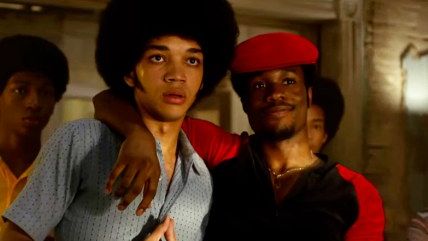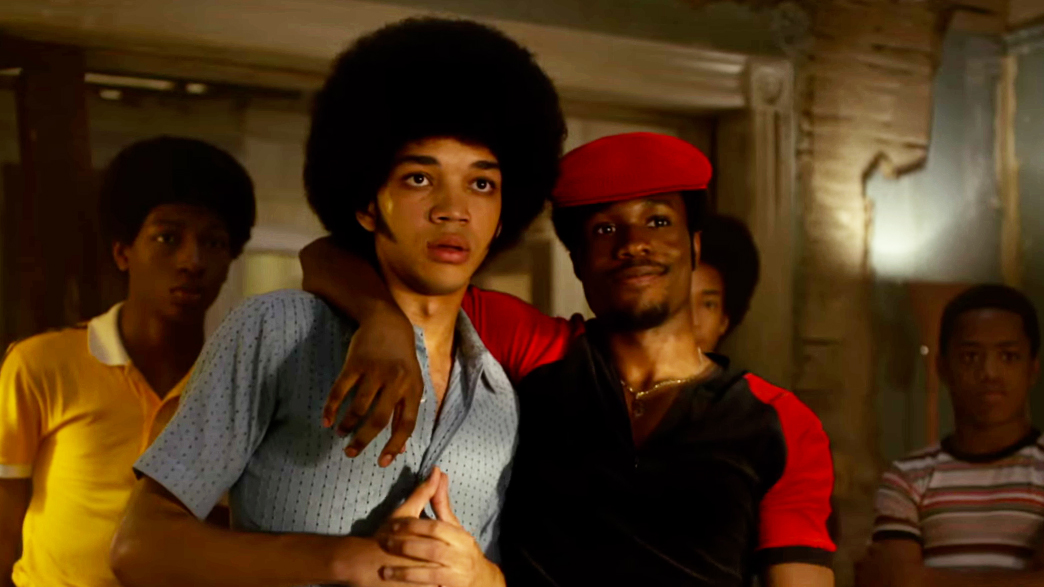Baz Luhrmann Just Doesn't Get It with The Get Down
Also: A truly awful Elvis movie.


The Get Down. Available Friday, August 12, on Netflix.
Elvis Lives! AXS TV. Tuesday, August 16, 9 p.m.
I don't know if music has really been going downhill ever since Buddy Holly died, but there certainly has been some wretched television made about it. Turn on your set this week if you don't believe me.
Okay, "wretched" is too harsh a word for The Get Down, Netflix's new series about the early days of hip-hop, on which a number of rap pioneers including Grandmaster Flash and Kurtis Blow consulted. But "bloated," "derivative," and "self-important" all seem fair, as does "scandalously overpriced." If producer-director Baz Luhrmann really, as has been reported, spent $120 million and 10 years to develop this thing, Netflix's accountants should be taken out and shot, and I don't mean with a camera.
The premise of The Get Down—one of the various names the new music went by before "rap" and "hip-hop" stuck—Is interesting enough. Set in the 1977-79 time period when Manhattan was still in the glam grip of discos like Studio 54, it follows a bunch of black and Puerto Rican kids in the Bronx who are discovering the grittier attractions of tagging, break-dancing and rap—the various strands that will grow into hip-hop culture.
Ezekiel (Justice Smith, Paper Towns) is a teenage poet scorned at home and frustrated in his pursuit of the gorgeous and talented Mylene (newcomer Herizen Guardiola), a Donna Summer wannabe. Ezekiel's spacey but talented pal Dizzee (Jaden Smith, The Pursuit of Happyness) wants to make a name for himself as a graffiti artist, just as the the legendary and ghostly subway tagger who calls himself Shaolin Fantastic (real-life rapper Shameik Moore) is ready to turn in his paint cans for turntables.
Call it the commonality of the teenage experience, or call it an homage to the 1970s film and TV shows from which Luhrmann freely borrows. (Everything from Saturday Night Fever to Thank God It's Friday to Kung Fu; and Spike Lee is likely to use a less polite term than "borrow" for the generous helpings of Summer of Sam and Crooklyn stirred into The Get Down.) But the scenes of teenagers getting nagged by adults to get summer jobs, or carped at for listening to the latest incarnation of "the devil's music," could have been spliced in from nearly any film about adolescents made in the last 60 years. Literally: When Ezekiel's uncle mocks his ghetto-life poetry by reading it aloud in a Masterpiece Theatre voice, the resemblance to a sneering Steve Allen reciting the lyrics of "Be-Bop-A-Lula" on The Tonight Show is uncanny.
That's not necessarily a criticism. (Of the movie, not Steve Allen, who has another few thousand years of writhing in Hell before he atones.) The Get Down is actually sweetly charming in the moments when the kids are practicing the Hustle for the big weekend dance concert, speculating excitedly about the content of this new Star Wars movie, or arguing the comparative merits of various comic-book characters.
But those moments get fewer and further apart as The Get Down lurches forward into vainglory, pretension, and wild excess. Teenage wonder at the world mutates into grandiose aphorism. "When we see our names on these [subway] trains, even for a fleeting moment, we can say, I was here," declares a tagger, only to be outdone moments later by Jimmy Smits, playing a politician apparently from the Unicorns and Rainbows Party, who looks across the jagged ruins of the South Bronx and announces: "I see homes for my rainbow people."
The bombast is not restricted to the dialogue. The Get Down is marked by the same everything-but-the-kitchen-sink messiness that colored Luhrmann's remake of Moulin Rouge! Everywhere you look there's a shootout or a chase or a fistfight or a Gotterdammerung dance contest or one character delivering a soul-crushing speech to another. Camera trickery that's probably meant to emphasize the characters' epic sense of themselves instead induces an uneasy sense that you're watching the waaaay-too-long prologue to The Fantastic Four Visits the Bronx.
Most annoying is The Get Down's conceit that hip-hop was some kind of purgative to the Gucci-Fiorucci dissipation of disco. The bitches-and-bling themes that make so much hip-hop unlistenable were present right from the start, and as that whopping $120 million price tag on The Get Down demonstrates, show no sign of attenuating.
What may be on the wane is AXS TV boss Mark Cuban's bank account. He apparently couldn't afford real writers, actors or directors for Elvis Lives!, the network's first original movie, so he rounded up a bunch of escapee lemmings from films like Mega Shark vs. Giant Octopus and Blood Lake: Attack Of The Killer Lampreys to throw their careers off a cliff. Elvis Lives! creates a black hole of sheer awfulness that threatens to suck in the entire universe and spit it back out as wayward atoms of desiccated goat feces.
Elvis Lives! stars, if I may abuse the English language past the point of a Nazi war crime, Jonathan Nation (yes, that Jonathan Nation, of Cataclysmo and the Time Boys) as the dissolute and drug-addicted Elvis at the end of his days. Searching for a post-music career, he offers to help the FBI with a mafia sting. Afterward, when cars start exploding on the Graceland front lawn, Elvis contemplates staging his own death and starting the new incognito life in which he pursues his long-time dream of being a fat guy who cleans the grill at a seedy burger joint.
Spoiler alert: The show ends with you sprawled on your couch, your skull steaming as the red-hot pokers you've pounded into your eyes sear the scrambled remnants of your brain. While I sit across the room whispering, "I told you so."


Show Comments (43)